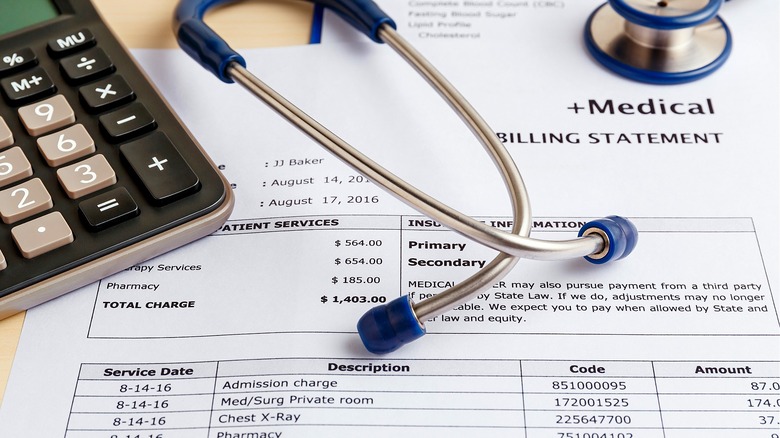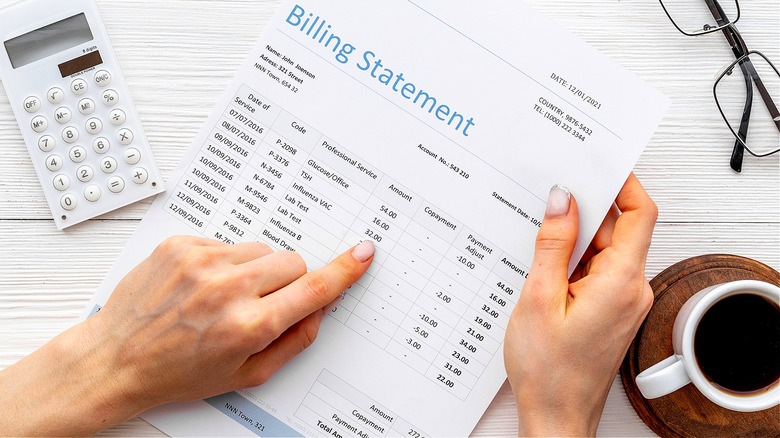Always Ask For This One Thing Before Paying A Medical Bill
The next time you receive a bill from the hospital, before you pay anything, be sure to ask for this one thing: an itemized medical bill. As medical billing advocates explain, the medical billing system is a complex one, and your bill will go through various stages before it reaches you. In that time, the numbers suggest it's likely something will go wrong, which could end up costing you considerably.
Consider, there's an entire industry, medical bill advocacy, that's dedicated to better understanding medical billing, including spotting errors. So, to protect yourself, it's prudent to request an itemized medical bill from your provider, one you can go over line by line and cross-check with your medical records (which you should also request), to ensure your bill isn't one of the many medical bills that contain some kind of error, an occurrence billing advocates estimate can be happening as much as four out of every five times (via Becker's Hospital Review).
Why you need to request an itemized medical bill
Even if the amount of medical billing errors has improved from the estimated 80% of the past (via USA Today), the number still isn't zero. And so long as there are still errors on medical bills, then it's important you take the initiative and do what you can to ferret out any errors on your bill. As said, the way you can do this is to 1) not pay anything on your bill right away and 2) request an itemized bill, which hospitals typically don't send on their own.
Speaking to Insider, Cailtin Donovan, health care policy expert at the National Patient Advocacy Foundation, said of billing errors today, "We estimate about half of all medical bills have a mistake in them and we've never seen a mistake work out in a patient's favor." Although itemized versions of medical bills are now sometimes made available via digital records, this isn't a universal practice. If you're dealing with a paper statement, then chances are you'll need to request a more detailed bill.
What an itemized medical bill tells you
An itemized medical bill will contain a line-by-line breakdown of the treatment, services, and/or supplies you received during your visit, and will also list the corresponding CPT (Current Procedural Terminology) codes that are published by the American Medical Association. If these codes aren't accurate, it could lead you to being wrongly charged.
For example, the AMA explains how initial and sequential intravenous hydration over two days are different (96374 vs. 96376) and should be billed with the proper start and stop times. To give you an idea of how easily codes can be mixed up by human error (or fraudulently changed with intent, also known as upcoding), there are some 10,000 CPT codes currently in use.
If you find errors in your bill, your insurance company might be able to help. Note, it's important to determine if the billing error is from the health care provider or from your insurance company; it's possible your insurer covered less than what you thought it would, which you'll be able to see via the EOB (explanation of benefits) statement the company sends you. Note that clerical errors resulting in the wrong policy/insurance company being listed could lead to billing issues, too. An itemized bill will also list dates and who saw you on that day.
Spotting errors in an itemized medical bill
While an itemized medical bill likely isn't necessary for a simple office visit, as you likely have a good idea of what your visit should cost and will be able to spot numbers that don't add up, if your hospital visit/stay was longer and more involved, then obtaining an itemized bill is the prudent thing to do. Common medical billing errors include the aforementioned coding issues (e.g., transposing two numbers), and something as simple as getting your name wrong or even your room number.
Go over the bill's charges carefully, line by line. Errors may include duplicate charges, charges for treatment you didn't receive or recognize, and any charges that seem too high. Given that there are approximately 10,000 CPT codes, to go along with even more codes from the Healthcare Common Procedure Coding System (HCPCS), it may seem a daunting task to try and unlock numbers in an itemized medical statement, but it's important you do, especially if you need to dispute anything.
To help, you can look up codes via the Centers for Medicare & Medicaid Services search bar. You can also do so by searching a search engine; simply enter the code with "medical billing code." This will return the code's description, which you can then compare to the care you received. Is there a discrepancy?



